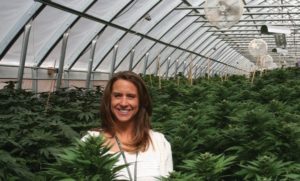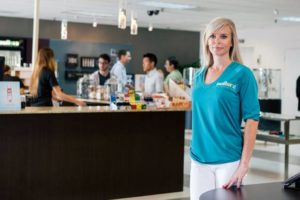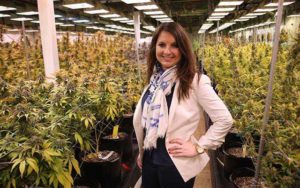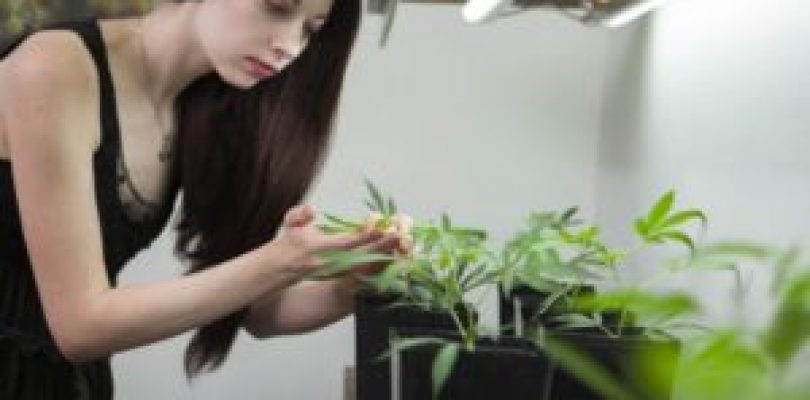While it’s certainly not easy to achieve success in the heavily regulated legal marijuana industry, it’s a field that remains highly accessible to savvy entrepreneurs. That’s especially true in Colorado, which unlike other emerging markets doesn’t have a limit on the number of licenses to grow and sell pot. The result is an industry with a diverse set of business owners, including a significant contingent of women. Data is hard to come by, but anecdotal evidence suggests that it is far more inclusive than tech and many other hot startup fields. To ensure the continued presence of women, people from the cannabis industry in 2014 founded Women Grow, a Denver-based network that now has 29 chapters across the United States. Women Grow estimates that about 20 percent of cannabis business owners are women, a number higher than tech but one that still needs work. Co-founders Jane West and Jazmin Hupp tell Inc. that while it’s certainly a challenge, gender equality is a much more attainable goal in the marijuana industry compared with what they encountered in the tech startup world.
From software companies to large grow facilities, women are represented in leadership positions in the cannabis industry like no other, Hupp and West say. “Cannabis has more female entrepreneurs because it’s nascent,” says West, who is also the founder of cannabis-friendly events company Edible Events Co. “We’re working with a blank slate. Most of these companies didn’t exist five years ago, so there isn’t a patriarchy and nepotism like other industries.”
Below, check out three women who are playing pivotal roles in Colorado’s legal weed industry.
Genifer Murray, CannLabs
 Genifer Murray wasn’t always an entrepreneur. Although she had a degree in microbiology, she worked sales jobs in telecom, fitness, and real estate before going into the marijuana business. One day in 2009, when she was visiting her father in Arizona, she found herself in a conversation with a man at a bar. They started talking about microbiology and then the subject shifted to pot. The idea arrived: What if you tested pot for potency in the same way as pharmaceutical drugs? The following year, she co-founded CannLabs, a company that tests cannabis flowers, hash oil, vape pens, and THC-infused edibles to ensure they comply with state law. Now the president of a public company — CannLabs is a penny stock — Murray says it took her a while to even consider going out on her own. “I wanted to matter, I didn’t want to go to work and just blend in,” she says. “I just needed help getting started, taking that initial risk.”
Genifer Murray wasn’t always an entrepreneur. Although she had a degree in microbiology, she worked sales jobs in telecom, fitness, and real estate before going into the marijuana business. One day in 2009, when she was visiting her father in Arizona, she found herself in a conversation with a man at a bar. They started talking about microbiology and then the subject shifted to pot. The idea arrived: What if you tested pot for potency in the same way as pharmaceutical drugs? The following year, she co-founded CannLabs, a company that tests cannabis flowers, hash oil, vape pens, and THC-infused edibles to ensure they comply with state law. Now the president of a public company — CannLabs is a penny stock — Murray says it took her a while to even consider going out on her own. “I wanted to matter, I didn’t want to go to work and just blend in,” she says. “I just needed help getting started, taking that initial risk.”
Murray says aversion to risk is an issue for many women. “It’s about changing the way women think about things. I always thought I needed to work for someone until I realized I needed to be working for myself.” she says. Because marijuana was illegal since 1937, product standards have traditionally been nonexistent. CannLabs provides a platform for companies to ensure their products are safe to ingest. With 54 percent of all cannabis companies in Colorado using CannLabs, the company runs up to 400 tests a day, according to Heather Depres, the company’s lab director.
After five years of collecting information from hundreds of growers, CannLabs launched StrainData, a site where consumers can learn about the potency and effects of various strains and which dispensaries sell them. The data not only helps consumers ingest safer, pesticide-free weed, Murray says, it enables growers and dispensaries to make sure their product’s quality is consistent. “We can run studies and averages and look at the data — if your Sour Diesel is usually 20 percent THC and then one week it’s at 12 percent, you know you have a problem,” she says. “Whereas before, you judged by smelling and looking at it.” CannLabs currently has two facilities — one in Denver and one in Connecticut. A third lab, which will be the biggest facility to date, is being built in Nevada. Like Women Grow’s founders, Murray says the fact that the legal weed industry started so recently has allowed it to become a platform for female leaders to excel.
“How often do we get a brand new industry?” she says. “Whatever you do at whatever company you work at now, you can start over in cannabis. Man or woman, you can use your skills from another industry and apply them to this industry. It is literally a land grab.”
Jamie Perino, Euflora
 Before opening one of the most-visited dispensaries in Denver, Euflora co-founder Jamie Perino was in architecture and construction, where she was often the only woman on a project. “It was a hugely male-dominated industry — it was harder to get your ideas across because they were more set in their ways,” she says.
Before opening one of the most-visited dispensaries in Denver, Euflora co-founder Jamie Perino was in architecture and construction, where she was often the only woman on a project. “It was a hugely male-dominated industry — it was harder to get your ideas across because they were more set in their ways,” she says.
But in the cannabis industry, Perino says, the demographics are younger and one gender doesn’t dominate. “There is a serious opportunity for future growth,” she says. “For women, that is a great thing. We have the opportunity to be drivers of an industry worth billions of dollars.”
Euflora, known as the “Apple store of weed” — its displays feature glass jars of pot with tablets next to them so customers can learn about each strain — attracts 2.5 million visitors a year. Perino and her business partner Pepe Breton opened their tourist-friendly dispensary in downtown Denver’s 16th Street Mall in April 2014.
Within their first year in business, the duo opened two more locations, both in the town of Aurora, Colorado. In the next couple of months, Perino and Breton, who are featured in MSNBC’s TV series Pot Barons, hope to open their own marijuana greenhouse to reduce the company’s reliance on electricity, and to receive an extraction and manufacturing license so they can start their own line of THC concentrates and edibles. Perino and Breton were introduced by a mutual friend and got the idea to build their own dispensary after visiting a few where Perino felt intimidated while deciding what to buy. Neither are avid pot smokers, and they felt there was a market for a dispensary that catered to people who don’t have experience buying weed. “We want everyone to be comfortable in our store and leave having had a great experience,” she says. Perino says navigating the pot industry’s complex regulatory issues is a challenge, but it also fosters a camaraderie among people in the business that pushes aside gender politics.
“Everyone is in the same position and wants success for the whole industry,” she says. “It doesn’t matter if you’re male or female — everyone just has respect for you because you’re putting everything on the line.”
Brooke Gehring, Live Green Cannabis and Patients Choice
 By 7 p.m. in Denver, all the dispensaries are closed. If you didn’t re-up beforehand, you’ll be taking resin hits from your empty bowl for the rest of the evening. But in Edgewater, a town over from Denver, Brooke Gehring’s Live Green Cannabis is open until midnight.
By 7 p.m. in Denver, all the dispensaries are closed. If you didn’t re-up beforehand, you’ll be taking resin hits from your empty bowl for the rest of the evening. But in Edgewater, a town over from Denver, Brooke Gehring’s Live Green Cannabis is open until midnight.
Gehring, who is also a founding member of Women Grow, co-owns four dispensaries and two grow facilities in the Denver metro area. In 2011, she, Steve Szymanski, and Michael Farley, operating under the corporate name FGS Inc., bought Patients Choice, a medical marijuana dispensary that had been in business since 2009. Three years later the team opened Live Green Cannabis in Edgewater. Today, the team’s businesses bring in $10 million a year. Gehring, who is the CEO of FGS, is also on the board of Vireo Health, one of two medical marijuana license holders in Minnesota.
A former commercial banker for Bank of the West in Colorado, Gehring spent 10 years managing large lines of credit and auditing accounts for compliance. After the crash of the real estate market she was in charge of liquidating the properties of people who failed to pay their mortgage. While managing a real estate portfolio in 2009, she found out about early entrepreneurs setting up cannabis companies. The experience led to a whole new career. With her background in financial compliance and commercial banking, she realized she could help people navigate the nascent medical marijuana industry’s regulatory framework, just like she helped people in other industries. “It’s the same thing — paperwork, dilligence, and detail,” she explains.
After researching the field, Gehring quit her job and started Live Green Cannabis Consulting to direct people through the regulatory hoops of Colorado’s medical marijuana industry. In 2010, she got a seat in the state’s marijuana industry rule-making work groups. After 10 months of consulting and rule formulation work, Gehring found an opportunity to buy the popular Patients Choice medical dispensary. The partners formed FGS, and today Gehring holds 16 state licenses and 16 local licenses for medical and recreational growing, cultivation, and sales. With two grow facilities and 10,000 plants, her company produces around 300 pounds of pot a month — enough to supply every location of Patients Choice of Colorado and Live Green Cannabis with 100 percent of its product. Looking back at how she became a major player in the marijuana industry in just a few years, Gehring says there is no other field where a move like that would be possible.
“In cannabis, what would take 10 years of climbing the corporate ladder for a woman is so much more accelerated,” she says. “Women entrepreneurs can come in with their skills and ideas and make them their own.”





